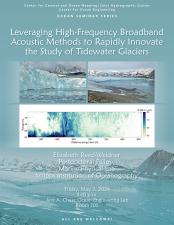Leveraging High-Frequency Broadband Acoustic Methods to Rapidly Innovate the Study of Tidewater Glaciers
Marine Physical Lab
Scripps Institution of Oceanography
The ice-water interface of marine-terminating (tidewater) glaciers in high latitude fjords represent a critical transition zone, linking the terrestrial, cryosphere, and ocean systems. These glaciers are important drivers of global ocean dynamics and, given their direct connection to both atmospheric and ocean forcing, are highly sensitive to climatic changes. A central challenge in characterizing the ice-water interface lies in the gap between the observational needs and the current sampling capabilities in the isolated, dangerous near-terminus region. Active acoustic systems can fill these gaps by making remote, high-resolution, quantitative observations. This presentation will discuss a 2023 field campaign in Svalbard, where a near-horizontal orientation geometry was employed to collect the first ever broadband acoustic measurements of a tidewater glacier. Preliminary results from the analysis of submerged terminus geometry and dynamics of a subglacial discharge plume are discussed, along with the potential for these types of acoustic measurements in other high latitude glacial systems in the future.
Liz is postdoctoral fellow with the Marine Physical Lab at Scripps Institution of Oceanography where she is using broadband split-beam echosounders to characterize the ice-ocean interface, gas bubbles, and thermohaline structure in high-latitude glacial fjords. She received her Ph.D. in oceanography jointly from the University of New Hampshire and Stockholm University in 2022. Next January she will join the faculty of the University of Connecticut as an Assistant Professor of Coastal Oceanography with the Marine Sciences Department to continue her research efforts in polar systems.





